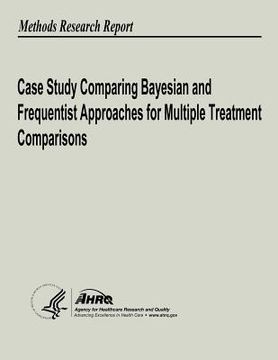Compartir
Case Study Comparing Bayesian and Frequentist Approaches for Multiple Treatment Comparisons (en Inglés)
U. S. Department of Heal Human Services
(Autor)
·
Agency for Healthcare Resea And Quality
(Autor)
·
Createspace Independent Publishing Platform
· Tapa Blanda
Case Study Comparing Bayesian and Frequentist Approaches for Multiple Treatment Comparisons (en Inglés) - And Quality, Agency for Healthcare Resea ; Human Services, U. S. Department of Heal
$ 24.180
$ 48.350
Ahorras: $ 24.170
Elige la lista en la que quieres agregar tu producto o crea una nueva lista
✓ Producto agregado correctamente a la lista de deseos.
Ir a Mis Listas
Origen: Estados Unidos
(Costos de importación incluídos en el precio)
Se enviará desde nuestra bodega entre el
Jueves 11 de Julio y el
Jueves 18 de Julio.
Lo recibirás en cualquier lugar de Chile entre 1 y 3 días hábiles luego del envío.
Reseña del libro "Case Study Comparing Bayesian and Frequentist Approaches for Multiple Treatment Comparisons (en Inglés)"
There is growing interest in assessing the relative effects of treatments by comparing one with another. Because few studies are typically available to provide evidence from direct head-to-head comparisons; we must frequently rely on indirect comparisons that use statistical techniques to estimate the treatment effects from studies of each given treatment against controls under an assumption of consistency. A number of techniques have been proposed to address this challenge. The problems with such systematic reviews, metaanalysis, and synthesis in general are that the circumstances of each study and the samples examined may vary and controls may differ among studies. Mixed (or multiple) treatment comparisons (MTCs), sometimes called network meta-analysis, refers to methods that compare treatments by combining all available evidence from studies that form a network of evidence (including studies comparing three or more treatment arms) in the absence of direct head-to-head comparisons. By synthesizing direct and indirect comparisons, we can improve the precision of estimates for treatment effects. While frequentist methods for MTCs certainly exist, they become increasingly difficult to fit less constrained models. A Bayesian analysis can easily construct such complicated models with less assumptions and permits explicit posterior inference regarding the probability that each treatment is "best" for a specific outcome. Two major issues to be considered in MTC meta-analysis are statistical heterogeneity and evidence inconsistency. We conducted a systematic literature review that analyzed clinical comparative efficacy of pharmacological treatments for urgency urinary incontinence (UI) in adult women. Statistical heterogeneity represents effect size variability between studies. Since each study is conducted under different conditions and populations, study-specific effect sizes may vary even when they are drawn from an underlying population of study effects that has a common mean. Evidence inconsistency is another source of incompatibility that arises between direct and indirect comparisons. In many MTCs, it is possible to make both direct and indirect comparisons for some pairs of treatments. When discrepancies exist between direct and indirect comparisons in terms of size and directionality, these deviations are called evidence inconsistency. Urgency UI is defined as involuntary loss of urine associated with the sensation of a sudden, compelling urge to void that is difficult to defer. Continence (complete voluntary control of the bladder) has been considered a primary goal in UI treatment and is the most important outcome associated with quality of life in women with UI. We synthesized rates of continence, improvements in UI, and discontinuation of the treatments due to adverse events (AE) of drugs from 83 randomized controlled trials (RCTs). In this report we introduce general hierarchical models to fit such data and applied both Bayesian and frequentist approaches to estimate the comparative efficacy and safety of selected drugs. This review utilized traditional frequentist meta-analysis techniques and concluded that drugs for urgency UI have comparable efficacy, and that the magnitude of the benefits from such drugs is small. As such, treatment decisions should be made based on comparative safety of the drugs. Few head-to-head trials were available to provide direct estimates of the comparative efficacy of the drugs. Also, we introduce more complex Bayesian hierarchical models that account for evidence inconsistency. We compare the frequentist and Bayesian approaches and provide tools to find the best treatment by using some metrics and clinically useful summary statistics that have meaning for patients and practitioners.
- 0% (0)
- 0% (0)
- 0% (0)
- 0% (0)
- 0% (0)
Todos los libros de nuestro catálogo son Originales.
El libro está escrito en Inglés.
La encuadernación de esta edición es Tapa Blanda.
✓ Producto agregado correctamente al carro, Ir a Pagar.

